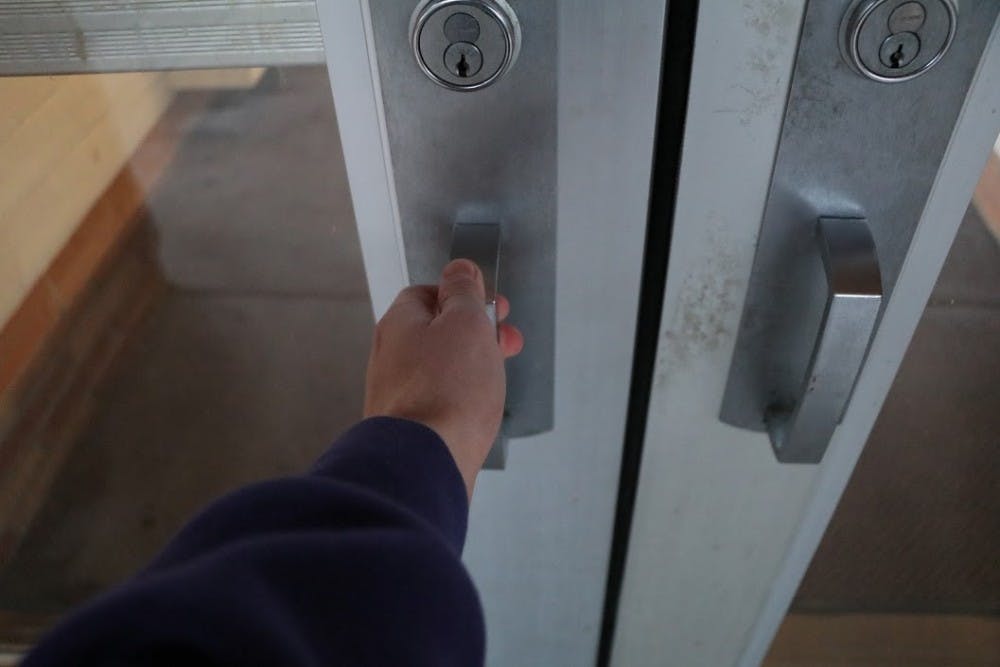There are over 1,000 new Pilots roaming The Bluff, but new to the University of Portland or not, it can be difficult to identify what rights and stipulations you have on campus regarding your privacy. Even for those who have read the student handbook, Life on The Bluff, some of the policies can be tough to understand.
In a moment in history when “#Resist” has become a popular hashtag, knowing the rights you have as a citizen has become an important topic of conversation. At a private university, those rights can become more limited. Here’s a breakdown of the parameters of student privacy on The Bluff.
Be careful what you keep in your dorm room. UP’s policy regarding room searches, as outlined in line #25 of UP’s Residence Life and Housing Contract and in the Room Entry and Inspection section of Life on the Bluff, allows authorized individuals to enter and search rooms if reasonable suspicion exists that a university policy has been violated.
Gerry Gregg, director of Public Safety, stated that it is an extremely rare situation in which Public Safety would enter a student’s room without their consent or presence. Such an entry would require reasonable suspicion, which Gregg described as, “when a reasonable person, more often than not, would believe that a violation of policy has occurred.”
Sarah Meiser, associate director for community standards at Residence Life, said that whether or not individuals are authorized to enter your room is dependent upon the situation.
If a pipe bursts and your dorm room is flooding, or there is another maintenance issue, Meiser said Physical Plant workers will key into your room to fix it, and if time allows, alert you beforehand.
A Residence Life staff member will also do a “fire/life inspection” of each student’s room at least once a year. The student is notified about when the inspection will take place, but if they are not in the room during the scheduled time, the inspection will go on in their absence.
Generally, staffers are looking for fire hazards like candles or contraband. There are a surprising items on the list of what can be taken up as contraband.
Self-defense items such as mace, tasers and pocket knives longer than 2.75in are banned, according to UP’s weapons policy.
The logic behind this ban, Meiser explained, is that without proper training, these sorts of weapons pose more of a danger to the students themselves than to potential attackers.
If a student is found with a weapon on campus, Public Safety is required to confiscate that item, write a report, and the item can potentially be returned after review.
Meiser explained that although not expressly part of university policy, university personnel will likely notify you if anyone has been, or will be, in your dorm room.
All incident reports and sanctions are stored in a student’s conduct record, which can only be accessed by a select group of individuals, including hall directors and Meiser.
Meiser said that certain organizations such as ASUP or the Office of Study Abroad can request to access information on a student’s conduct record if they apply for a position, but all such requests go through her.
If a student wishes to view their own conduct record, they can request to do so during regular business hours in the Residence Life office in Tyson 123.
UP can also monitor students’ internet usage. However, Michelle Sunderland, director of Information Services, said that this is limited to what the university is required to do legally and with regard to safety concerns.
“Internet traffic is logged, and there’s data available for us,” said Sunderland.
She explained that although data is collected, it’s not closely monitored. The collected data would likely only be used in the case of suspected illegal activity.
“We have a process where we will try to track [the illegal activity] down, and follow up with that person,” Sunderland said.
Beyond that, UP reserves the right to access and maintain student emails housed on their servers, as outlined in the Internet Connectivity and E-mail section of Life on the Bluff.
Sunderland said she thinks it is important that students know the University can access their email and student accounts.








